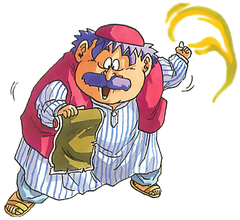Magic and Abilities
In the Dragon Quest franchise, characters and monsters have access to various magic spells and, in later installments, abilities for use in combat. These actions are selected from the command menu while battling, which displays the effects, target range, and MP cost of the ability.
Spells[edit]
- Full article: Spell List
Magical spells are incantations cast by characters to suit a variety of situations and can be grouped into five categories: dealing elemental-themed damage to the targets, healing damage done to the self and allies, weakening enemies while strengthening allies, trying to inflict negative conditions on to the enemy in order to make them lose a turn, and easing the player's ability to traverse the world map.
In order to be cast, all spells require MP--Magic Points. MP is the resource that fuels magic with each spell having its own price per usage, with the cost being approximate to the strength of the spell. For example, the weakest explosion spell Bang usually costs 5 MP but the stronger Boom costs 8 MP. Recovering MP when away from a village Inn can often only be done via rare items like the Magic water, so carefully conserving a character's MP when exploring a Dungeon is crucial to keeping the party alive.
All games in the series allow magically-inclined characters to learn a spell by accumulating enough experience points in battle to advance to the level when a particular spell is set to be learned, but certain titles allow characters to learn magic via other means. Some examples are the Hero of the fifth game learning the Zoom spell by helping an old researcher hunt down the final ingredient he needs, and more recently Veronica learning Kaboomle by unlocking it through her character builder. Magic amongst common folk is not unheard in the worlds seen in the series, at least as far as weaker spells go: every Priest is able to cast Squelch to cure a disease or poison and NPC dialogue implies that anyone can learn a few spells with enough study.
Magic spells have been around since the earliest computer RPGs such as the Ultima series and the Wizardry games. These titles made casting a spell rather tedious, with both series requiring the player to type out the incantation on their keyboard and the former requiring several components know as reagents to be able to cast in the first place. 'Dragon Quest series creator Yuji Horii greatly simplified this concept by having the player select a spell from a menu and check if a character has enough MP to cast it--if they do not then the action cannot be taken during battle and the player will have to choose something else for that character to do during their turn.
Skills[edit]
- Full article: Ability List
The term "skill" refers to a broad group of physical actions that cannot be described as regular attacks or spells. Skills cover a wide range of actions with some focusing on deft weapon use, agile footwork, or rendering the body able to endure any punishment. Several skills can also be used in the field or in dungeons, providing reconnaissance or stealthily avoiding enemies. Most skills originally cost no MP to perform, but have since been assigned MP requirements to better adjust the balance of the games.
The first skill in the series was the fire breath used by monsters in the original game, but quickly expanded to a variety of different actions throughout the sequels. Skills performed by humans first appeared in Dragon Quest III: The Seeds of Salvation as the antics that Gadabouts would perform in battle, but these were selected at random and had just as much a chance of hindering the party as helping it. Players would be able to have reliable access to skills beginning with Dragon Quest V: Hand of the Heavenly Bride through the addition of tamable monsters: if an enemy monster could use a skill, so could its tamed counterpart. A monster's skills are grouped along with their spells in every version of V under a command menu option called "abilities".
Dragon Quest VI: Realms of Revelation introduced the concept of humans learning skills via advancing in level and acquiring them by progressing in rank from a variety of Vocations, and added a new option to the command menu specifically for skill selection.
Dragon Quest VIII: Journey of the Cursed King would alter the use of offensive skills by shifting them from techniques to be performed with any weapon to specialist actions that can only be used with the proper weapon equipped. For example if Yangus is equipped with an Axe then he will be able to perform Helm Splitter, but he will not be able to use the Hammer-only skills such as Heart Breaker.
Traits[edit]
Introduced in Dragon Quest VIII, traits are passive bonuses obtained after allocating skill points. Most of these just offer flat bonuses to attributes, but some feature unusual benefits such as increased evasion or reduction in MP costs. This feature would greatly proliferate in the Dragon Quest Monsters spin-off series after first Joker game, where in every single monster will have one or more traits that define their capabilities.
Dragon Quest XI would also have traits, allocated through a grid system using skill points. Increases in stats, in addition to abilities themselves, can be unlocked by spending skill points, with stronger skills or greater stat benefits being unlocked the further along the grid one is.
Ability Scrolls[edit]
Introduced in Dragon Quest I & II HD-2D Remake, Ability Scrolls are single-use items found through various means. As their name implies, they contain certain abilities written on them that can be learned. In the case of II, only certain members of the Scions of Erdrick can learn them. For example, the skill Multislice can only be learned by the Prince of Cannock.
